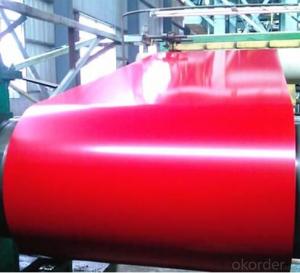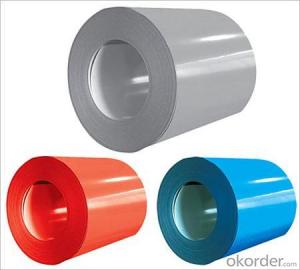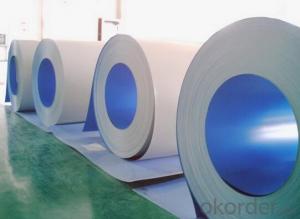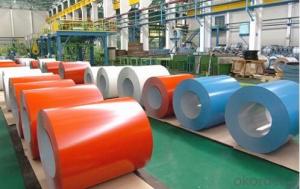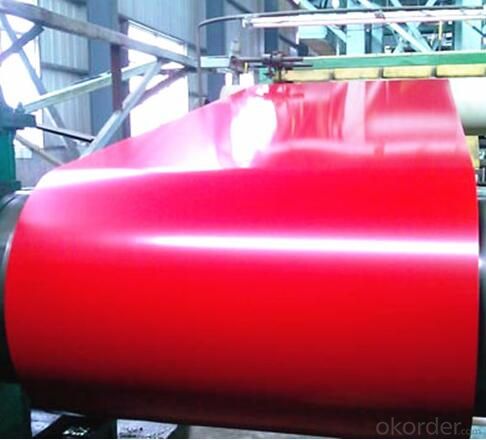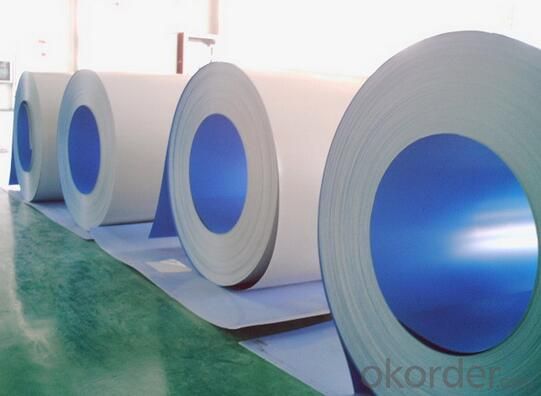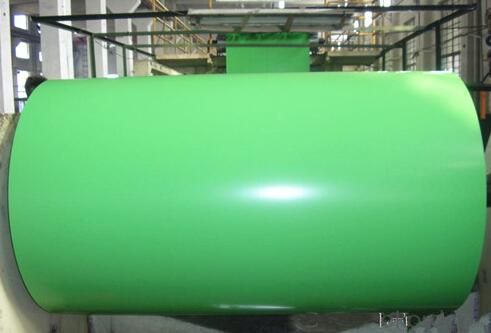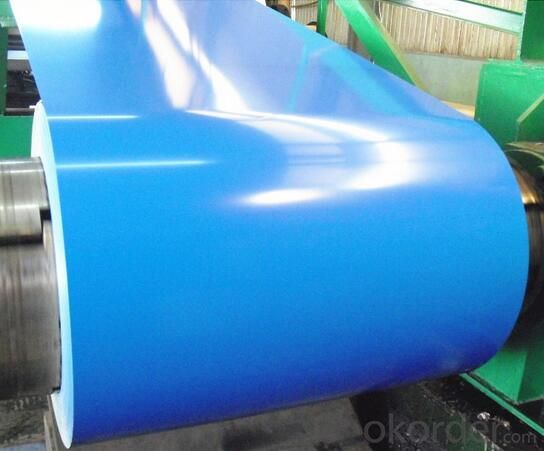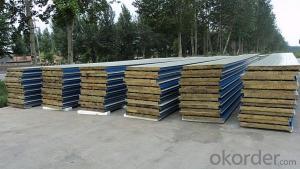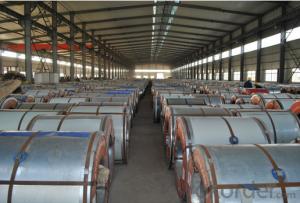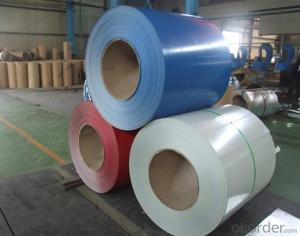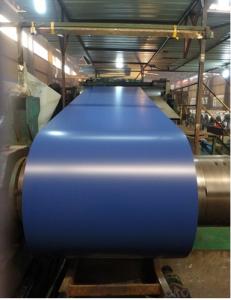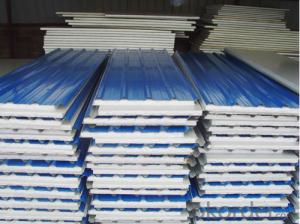Galvanized Color Coated Plate Roofing Sheet PPGI
- Loading Port:
- Tianjin
- Payment Terms:
- TT or LC
- Min Order Qty:
- 30 m.t.
- Supply Capability:
- 10000 m.t./month
OKorder Service Pledge
OKorder Financial Service
You Might Also Like
Specification
Galvanized Color Coated Plate Roofing Sheet PPGI
Details of Galvanized Color Coated Plate Roofing Sheet PPGI
Grade | DX51D, SGCC, CGCC |
Thickness | 0.15mm-1.5mm |
Width | 600mm-1500mm(914/1219/1250 are available) |
Standard | JIS G3312, ASTM,GB/T1275 |
Certificate | ISO9001.ISO14001.OHSAS18001 |
Length | As per requests |
Zinc Coating | 40g-275g/m2 |
Lacquer Coated | 20-25 microns/5-15 microns |
Coil ID | 508mm/610mm |
Coil Weight | normally 3-10mt or as your requirement |
Supply ability | 200,000Mt/year (MOQ:25Mt) |
Color | RAL No. |
Price terms | FOB,CFR,CIF |
Payment terms | L/C,T/T |
Deliver time | 30days after received deposit or L/C |
Packing | Standard exporting package |
steel strip Water proof paper, metal covers, | |
Application | Corrugated roofing,outside building, |
boating building,car producing | |
household appliance | |
Main market | Southeast Asia , the EU, Russia, Ukraine , Latin America and other countries and Regions |
Specification of Galvanized Color Coated Plate Roofing Sheet PPGI
Thickness | Width | Length of plate | Inner diameter of coil |
0.18-1.2mm | 800/914/1000/1200/1219/1250mm | 1000-6000mm | 508mm/610mm |
Coated Mass: | |||
Available Coated Mass(g/m^2) | Base plate | Available Coated Mass(g/m^2) | |
60,80, 100, 120, 160, 180 | Galvanized Steel | 60,80, 100, 120, 160, 180 | |
50, 70, 150 | Galvalume Steel | 50, 70, 150 |
Painting | Item | Code | |
Polyester | PE | ||
High-durability polyester | HDP | ||
Silicon modified polyesters | SMP | ||
Polyvinylidene fluoride | PVDF | ||
Easy-Cleaning | — | ||
Painting Thickness | Top side: 20±5microns; | ||
Bottom side: 5~7microns. | |||
Color System | Produce according to RAL Color System or as per buyer’s color sample. | ||
Painting structure | Top surface | Bottom surface |
|
Primer coating | No coating | 1/0 | |
Primer coating | Primer coating | 1/1 | |
Primer coating + Finish coating | No coating | 2/0 | |
Primer coating + Finish coating | Primer coating or single back coating | 2/1 | |
Primer coating + Finish coatin | Primer coating + Finish back coating | 2/2 | |
CNBM Introduction of Galvanized Color Coated Plate Roofing Sheet PPGI
CNBM International Corporation is the most import and export platform of CNBM group(China National Building Material Group Corporation) ,which is a state-owned enterprise, ranked in 270th of Fortune Global 500 in 2015.
With its advantages, CNBM International are mainly concentrate on Cement, Glass, Iron and Steel, Ceramics industries and devotes herself for supplying high quality series of refractories as well as technical consultancies and logistics solution.
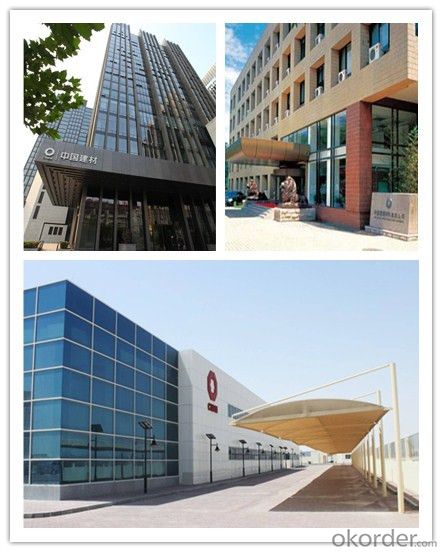
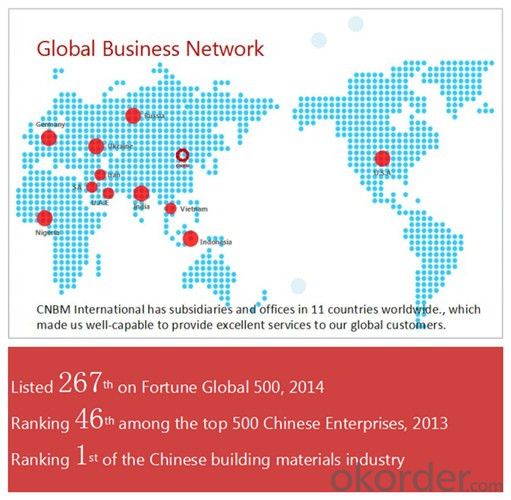
Packaging & Delivery of Galvanized Color Coated Plate Roofing Sheet PPGI
Packaging Detail | Sea worthy packing /as per customer's packing instruction |
Delivery Detail | 15 ~ 40 days after receiving the deposit |
Products Show
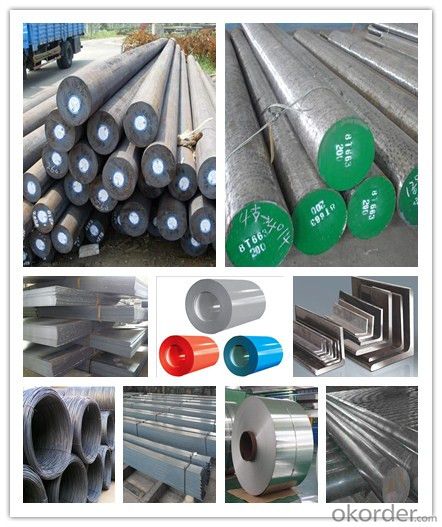
FAQ:
Are you a trading company or manufacturer? | Manufacturer |
What’s the MOQ? | 3 metric ton |
What’s your delivery time? | 15-35 days after downpayment received |
Do you Accept OEM service? | Yes |
what’s your delivery terms? | FOB/CFR/CIF |
What's the Payment Terms? | 30% as deposit,70% before shipment by T/T |
Western Union acceptable for small amount. | |
L/C acceptable for large amount. | |
Scrow ,Paybal,Alipay are also ok | |
Why choose us? | Chose happens because of quality, then price, We can give you both. Additionally, we can also offer professional products inquiry, products knowledge train (for agents), smooth goods delivery, excellent customer solution proposals. |
What's your available port of Shipment? | Main Port, China |
What’s your featured services? | Our service formula: good quality+ good price+ good service=customer's trust
|
Where are your Market? | Covering more than 160 countries in the world |
- Q: How does the composition of special steel affect its mechanical properties?
- The composition of special steel plays a significant role in determining its mechanical properties. Special steel refers to a type of steel that has been modified or alloyed with other elements to enhance its strength, toughness, hardness, and other desirable properties. The addition of various alloying elements, such as manganese, chromium, nickel, molybdenum, vanadium, and tungsten, can significantly impact the mechanical properties of special steel. For example, the addition of chromium can improve corrosion resistance and hardness, making the steel more suitable for applications in harsh environments. Manganese is often added to enhance the hardenability and tensile strength of the steel. Nickel can increase toughness and strength while maintaining good ductility. The amount and combination of these alloying elements can be adjusted to achieve specific mechanical properties. For instance, increasing the carbon content can enhance the strength and hardness of the steel, but it may decrease its ductility. On the other hand, decreasing the carbon content and adding elements like nickel and molybdenum can improve the steel's toughness and impact resistance. Additionally, the heat treatment process is crucial in influencing the mechanical properties of special steel. Through processes such as quenching and tempering, the steel's microstructure can be manipulated to achieve desired properties. Quenching, for example, involves rapidly cooling the steel to obtain high hardness and strength, while tempering helps reduce brittleness and improve toughness. In summary, the composition of special steel, including the type and amount of alloying elements, as well as the heat treatment process, plays a crucial role in determining its mechanical properties. By carefully selecting and controlling these factors, manufacturers can tailor special steel to meet specific performance requirements for various applications.
- Q: How is special steel used in the production of cutting blades?
- Special steel is used in the production of cutting blades because it possesses unique properties that make it highly durable, resistant to wear and tear, and capable of maintaining a sharp edge for longer periods of time. This type of steel is often chosen for its high hardness, toughness, and corrosion resistance, making it ideal for manufacturing cutting blades that can withstand intense cutting forces and harsh working environments.
- Q: What are the different types of tool steels used in special steel?
- There are various types of tool steels that are commonly used in special steel applications. These types of steels are specifically designed to exhibit exceptional hardness, wear resistance, toughness, and heat resistance, making them ideal for tooling and cutting applications. Some of the different types of tool steels used in special steel include: 1. Carbon Tool Steel: This type of tool steel contains high carbon content, typically ranging from 0.60% to 1.5%. It offers excellent hardness and wear resistance, making it suitable for applications such as drills, taps, and cutting tools. 2. High-Speed Steel (HSS): HSS is an alloy steel that contains a combination of various elements like tungsten, molybdenum, chromium, and vanadium. It provides exceptional heat resistance, hardness, and toughness, allowing it to retain its cutting edge even at high temperatures. HSS is commonly used in drill bits, milling cutters, and other cutting tools. 3. Cold Work Tool Steel: This type of tool steel is designed to be used at room temperature or lower temperatures. It offers excellent toughness, wear resistance, and strength. Cold work tool steels are used in applications such as blanking, piercing, and forming dies. 4. Hot Work Tool Steel: Hot work tool steels are specifically developed to withstand high temperatures without losing their hardness and strength. They have good thermal conductivity and can resist thermal fatigue and deformation. Hot work tool steels are used in applications like forging dies, extrusion dies, and die casting molds. 5. Shock-Resisting Tool Steel: This type of tool steel is designed to resist shock and impact loads. It provides excellent toughness, strength, and wear resistance. Shock-resisting tool steels are commonly used in applications such as hammers, chisels, and pneumatic tools. 6. Stainless Tool Steel: Stainless tool steels contain high levels of chromium, which provides them with excellent corrosion resistance. These steels are commonly used in applications where resistance to rust and corrosion is essential, such as surgical instruments, molds, and cutlery. 7. Powder Metallurgy Tool Steel: Powder metallurgy tool steels are manufactured using a powder metallurgy process, which allows for precise control of the steel's composition and microstructure. These steels exhibit excellent wear resistance, high toughness, and good machinability. They are used in applications such as high-speed cutting tools and forming tools. Overall, the different types of tool steels used in special steel applications offer a wide range of characteristics and properties to meet the specific requirements of various cutting, forming, and tooling applications.
- Q: Can special steel be used for food processing equipment?
- Yes, special steel can be used for food processing equipment. Special steel, such as stainless steel, is commonly used in the food industry due to its excellent corrosion resistance, durability, and hygienic properties. It is resistant to rust, staining, and bacterial growth, making it ideal for food processing equipment where cleanliness and safety are crucial.
- Q: What are the different types of free-cutting steel?
- There are several different types of free-cutting steel, including leaded free-cutting steel, sulfurized free-cutting steel, and phosphorus free-cutting steel. These types of steel contain certain elements that improve machinability and make them easier to cut or shape.
- Q: How is tool and die steel used in the manufacturing of molds and dies?
- Tool and die steel is an essential material used in the manufacturing of molds and dies due to its high strength, toughness, and wear resistance properties. It is used to create precise and durable molds and dies that are capable of withstanding the high pressures and temperatures involved in the manufacturing process. This steel is carefully designed and machined to produce intricate shapes and forms required for various industries such as automotive, aerospace, and electronics. Tool and die steel ensures the longevity and accuracy of molds and dies, leading to efficient and high-quality production in manufacturing processes.
- Q: What are the different non-destructive evaluation techniques used for special steel?
- There are several non-destructive evaluation techniques used for special steel, including ultrasonic testing, magnetic particle inspection, liquid penetrant testing, eddy current testing, and radiographic testing. These techniques are used to detect flaws, defects, and structural integrity issues in special steel without causing any damage to the material.
- Q: How are aluminum alloys used in the automotive industry?
- Aluminum alloys are extensively used in the automotive industry due to their lightweight, high strength, and corrosion-resistant properties. These alloys are commonly utilized in the manufacturing of various components, such as engine blocks, cylinder heads, wheels, and body panels. By incorporating aluminum alloys, vehicles can achieve improved fuel efficiency, better performance, and enhanced safety while reducing overall weight and emissions.
- Q: How does tool steel maintain its hardness at high temperatures?
- Tool steel maintains its hardness at high temperatures primarily due to its high carbon content and the presence of other alloying elements. The carbon in tool steel forms hard and wear-resistant carbides, which help retain hardness even at elevated temperatures. Additionally, alloying elements such as chromium, tungsten, molybdenum, and vanadium contribute to the formation of secondary carbides, which further enhance the steel's resistance to softening and maintain its hardness under high heat conditions.
- Q: What are the applications of special steel in the manufacturing supply chain?
- Special steel has a wide range of applications in the manufacturing supply chain. It is commonly used in the production of machinery, tools, and equipment due to its exceptional strength, durability, and resistance to wear and corrosion. Special steel is also utilized in the automotive and aerospace industries for components that require high performance and reliability. Additionally, it finds use in construction, energy, and defense sectors, among others. Overall, special steel plays a crucial role in enhancing the quality and efficiency of various manufacturing processes and end products.
Send your message to us
Galvanized Color Coated Plate Roofing Sheet PPGI
- Loading Port:
- Tianjin
- Payment Terms:
- TT or LC
- Min Order Qty:
- 30 m.t.
- Supply Capability:
- 10000 m.t./month
OKorder Service Pledge
OKorder Financial Service
Similar products
Hot products
Hot Searches
Related keywords
